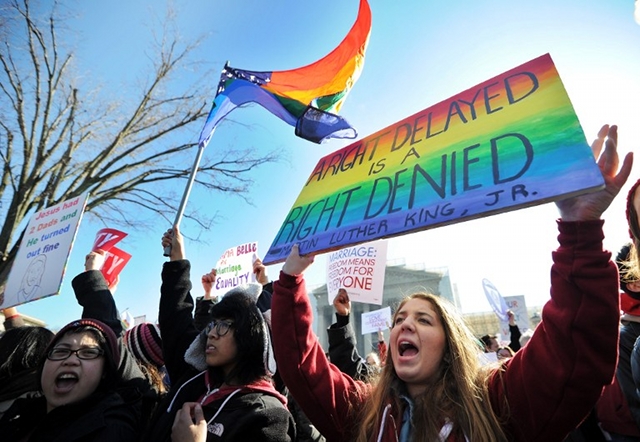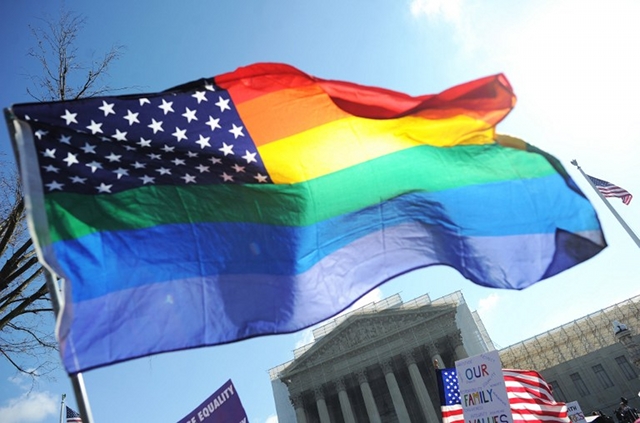SUMMARY
This is AI generated summarization, which may have errors. For context, always refer to the full article.

Regardless of this week’s outcome, the fact that the US Supreme Court is actually hearing arguments on marriage equality is surreal. The first same-sex couple that applied for a marriage license in 1970 must feel the same way as they watch this unfold together as coupled men in their 70s. Although I was born a few years into the 1970s, I still consider this week’s historical moment something I never thought would happen.
About 13 years ago, I co-founded the first university-based lesbian organization in the Philippines. It was a time when there still was no Google in which to search for the word lesbian, or to find fellow women who were also coming to terms with their unconventional sexuality.
We were contacted by our group’s first members after we posted stickers in women’s bathrooms that said, “Feel no shame for what you are,” and spent time with weepy teens getting kicked out of their homes and dorms after being outed as lesbians.
As real as that experience was, it seems like it was such a long time ago because things sure have changed. A little over a decade later, I am fortunate to be in the US and have a front row seat to this unfolding plot.
Unfolding events remold minds
As electrifying as the presidential elections were last November, the ballot also decided the fate of American gay couples. Voters approved same-sex marriage in 3 more states, bringing the number of states that have legalized same-sex marriage to 9.
15% of Americans now live in states that allow same-sex marriage, a number that would double should it be reinstated in California. If that happens, one-third of US residents would live in a state where gay couples have to be treated as equal to heterosexual couples by law, a fact that wasn’t as easy to accept only a few years ago.
Surveys suggest that 53% of Americans now support same-sex marriage, including 66% of those aged 18-29. Nate Silver concluded that due to generational turnover and changing sentiment, the percentage of the population supporting marriage equality will continue to increase regardless of what the Supreme Court decides in June.
Pop culture might be credited for this growing acceptance of homosexuality, some even believing that what people see on television is more effective in changing attitudes than expensive and dirty political campaigns.
The New York Times’ Maureen Dowd dubbed the Republican initiatives in the latest elections as “A Mad Men campaign in a Modern Family world,” emphasizing the force that immigrants, women and homosexuals undoubtedly are in today’s society.

Gay marriage as a political golden ticket
After Joe Biden prematurely expressed support for same-sex marriage in 2012, President Obama followed suit and voiced an opinion that wasn’t politically popular at the beginning of his term, but won him the last election (along with his other minority points).
Now former President Bill Clinton has expressed regret over passing the Defense of Marriage Act (DOMA) in 1996 and Hillary Clinton has just formally endorsed marriage equality. Even Republicans are rushing to raise their hand in support, and 200 corporations reportedly raced to include their names in the amicus brief filed with the Supreme Court.
Is it suddenly cool to be pro-gay, or is there a cash opportunity in supporting marriage equality? Whatever it is, the knowledge that majority of the country is in favor of granting equal rights to gay couples is changing business and politics in unprecedented ways.

What it means for Filipinos
It is largely expected that DOMA will be repealed by summer 2013, granting full and immediate federal benefits and rights to married same-sex couples nationwide. While this is a long-awaited victory for the LGBT community in the US, the legalization of gay marriage in what is considered to be the most powerful and most influential nation in the world will have effects in many homes, regardless of whether countries are even close to recognizing homosexuals as equals.
Even if the US is a few steps ahead of the Philippines when it comes to civil rights and progressive legislations, same-sex marriage victories outside the country bring conversations to the table.
Young people who see that the tides are changing around the world won’t be as alienated and isolated the way I was in the late-90s from a lack of visible role models. Seeing politicians get elected regardless of their sexuality and because of their position on same-sex marriage is proof that supporting equal rights is no longer a societal death sentence or political self-sabotage.
Second and more importantly, children will grow up knowing that being gay no longer relegates them to a life alone in the closet where finding a spouse and building a family may only be a fantasy or met with tremendous difficulty.
Seeing that homosexuals are treated as equals in a nation that is considered progressive as it is diverse, adolescents discovering their true feelings for the same sex might be less afraid to live and love freely. Parents’ attitudes toward gay relationships may change since homosexuality is no longer synonymous with a life without marriage or family.
My Facebook wall turned red in support of marriage equality. Gay and straight friends from the US and the Philippines changed their profile pictures to a red equal sign, and it warmed my heart to see all the heterosexual support for my homosexual marriage.
It is an exciting time for this reality to possibly be just around the corner, and although the rest of the world may be slow to follow, seeing this unfold in the US might allow gay people around the world, particularly young Filipinos who are still looking for shoulders to cry on, to finally feel no shame for who they are, and at long last, to be proud of who they love. – Rappler.com
Shakira Andrea Sison currently works in the financial industry while dabbling in several unrelated projects and interests. She is a veterinarian by education and was working towards an MBA while managing a retail corporation in Manila before relocating to New York in 2002. She blogs at shakirasison.com and is on Twitter.com/shakirasison.
Add a comment
How does this make you feel?
There are no comments yet. Add your comment to start the conversation.